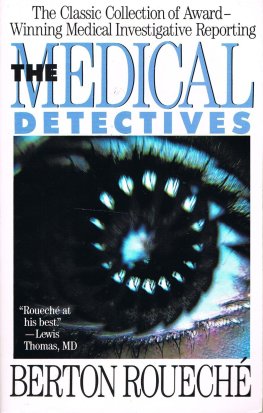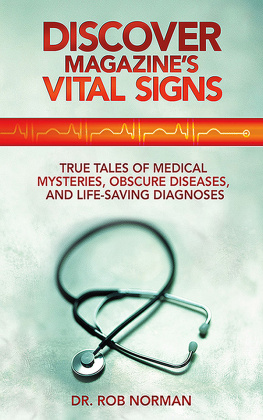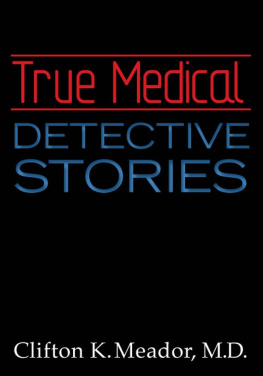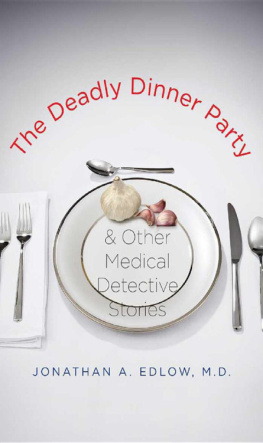TICKS, CARROTS, AND A PARAKEET NAMED LIBERACE. COULD ANY OF THEM BE DEADLY?
When thirty-nine schoolchildren fell ill in northern Arkansas, health officials immediately suspected a variety of "parrot lever" because of a sick little bird that local children called Liberace. But was the bird to blame? The truth would prove as intriguing as it was unexpected.
A forty-year-old dishwasher had a touch of dyspepsia. Within days he was dead. The only clue his physician had uncovered was a word the man uttered twice: "Schlachtfest"
A Schlachtfest is a pork feast, and there was one at a German-American meeting-and-banquet hall. But why did only the dishwasher get sick?
A woman doctor woke up feeling very sick with cramps, joint pain, and nausea. She drank a steaming cupful of milk and felt better. Later her symptoms worsened, especially when she and her husband visited their summer cottage. But he wasn't affected. Was her illness psychosomatic? Or was the doctor in jeopardy from a totally unexpected cause?
THREE OF THE FASCINATING CASES IN THE MEDICAL DETECTIVES
BERTON ROUECHE joined the staff of The New Yorker in 1944. His "Annals of Medicine" department and his stature as a medical journalist have been recognized by numerous awards, including those from the Lasker Foundation and the American Medical Association. He lived and worked in Amagansett, Long Island, for many years, and died, at age 83, in April 1994.
For: William Shawn
I hope that Lord Grey and you are wellno easy thing seeing that there are above 1500 diseases to which Man is subjected.
LETTER TO LADY GREY FROM SIDNEY SMITH
At about eight o'clock on Monday morning, September 25, l944, a ragged, aimless old man of eighty-two collapsed on the sidewalk on Dey Street, near the Hudson Terminal. Innumerable people must have noticed him, but he lay there alone for several minutes, dazed, doubled up with abdominal cramps, and in an agony of retching. Then a policeman came along. Until the policeman bent over the old man, he may have supposed that he had just a sick drunk on his hands; wanderers dropped by drink are common in that part of town in the early morning. It was not an opinion that he could have held for long. The old man's nose, lips, cars, and fingers were sky-blue. The policeman went to a telephone and put in an ambulance call to Beekman-Downtown Hospital, half a dozen blocks away. The old man was carried into the emergency room there at eight-thirty. By that time, he was unconscious and the blueness had spread over a large part of his body. The examining physician attributed the old man's morbid color to cyanosis, a condition that usually results from an insufficient supply of oxygen in the blood, and also noted that he was diarrheic and in a severe state of shock. The course of treatment prescribed by the doctor was conventional. It included an instant gastric lavage, heart stimulants, bed rest, and oxygen therapy. Presently, the old man recovered an encouraging, if painful, consciousness and demanded, irascibly and in the name of God, to know what had happened to him. It was a question that, at the moment, nobody could answer with much confidence.
For the immediate record, the doctor made a freehand diagnosis of carbon-monoxide poisoningfrom what source, whether an automobile or a gas pipe, it was, of course, pointless even to guess. Then, because an isolated instance of gas poisoning is something of a rarity in a section of the city as crammed with human beings as downtown Manhattan, he and his colleagues in the emergency room braced themselves for at least a couple more victims. Their foresight was promptly and generously rewarded. A second man was rolled in at ten-twenty-five. Forty minutes later, an ambulance drove up with three more men. At eleven-twenty, two others were brought in. An additional two arrived during the next fifteen minutes. Around noon, still another was admitted. All of these nine men were also elderly and dilapidated, all had been in misery for at least an hour, and all were rigid, cyanotic, and in a state of shock. The entire body of one, a bony, seventy-three-year-old consumptive named John Mitchell, was blue. Five of the nine, including Mitchell, had been stricken in the Globe Hotel, a sunless, upstairs flophouse at 190 Park Row, and two in a similar place, called the Star Hotel, at 3 James Street. Another had been found slumped in the doorway of a condemned building on Park Row, not far from City Hall Park, by a policeman. The ninth had keeled over in front of the Eclipse Cafeteria, at 6 Chatham Square. At a quarter to seven that evening, one more aged blue man was brought in. He had been lying, too sick to ask for help, on his cot in a cubicle in the Lion Hotel, another flophouse, at 26 Bowery, since ten o'clock that morning. A clerk had finally looked in and seen him.
By the time this last blue man arrived at the hospital, an investigation of the case by the Department of Health, to which all outbreaks of an epidemiological nature must be reported, had been under way for five hours. Its findings thus far had not been illuminating. The investigation was conducted by two men. One was the health Department's chief epidemiologist, Dr. Morris Greenberg, a small, fragile, reflective man of fifty-seven, who is now acting director of the Bureau of Preventable Diseases; the other was Dr. Ottavio Pellitteri, a field epidemiologist, who, since 1946, has been administrative medical inspector for the Bureau. He is thirty-six years old, pale, and stocky, and has a bristling black mustache. One day, when I was in Dr. Greenberg's office, he and Dr. Pellitteri told me about the case. Their recollection of it is, understandably, vivid. The derelicts were the victims of a type of poisoning so rare that only ten previous outbreaks of it had been recorded in medical literature. Of these, two were in the United States and two in Germany; the others had been reported in France, England, Switzerland, Algeria, Australia, and India. Up to September 25, 1944, the largest number of people stricken in a single outbreak was four. That was in Algeria, in 1926.
The Beekman-Downtown Hospital telephoned a report of the occurrence to the Health Department just before noon. As is customary, copies of the report were sent to all the Department's administrative officers. "Mine was on my desk when I got back from lunch," Dr. Greenberg said to me. "It didn't sound like much. Nine persons believed to be suffering from carbon-monoxide poisoning had been admitted during the morning, and all of them said that they had eaten breakfast at the Eclipse Cafeteria, at 6 Chatham Square. Still, it was a job for us. I checked with the clerk who handles assignments and found that Pellitteri had gone out on it. That was all I wanted to know. If it amounted to anything, I knew he'd phone me before making a written report. I hat's an arrangement we have here. Well, a couple of hours later I got a call from him. My interest perked right up."
"I was at the hospital," Dr. Pellitteri told me, "and I'd talked to the staff and most of the men. There were ten of them by then,of course. They were sick as dogs, but only one was in really bad shape."
"That was John Mitchell," Dr. Greenberg put in. "He died the next night. I understand his condition was hopeless from the start. The others, including the old boy who came in last, pulled through all right. Excuse me, Ottavio, but I just thought I'd get that out of the way. Go on."
Dr. Pellitteri nodded. "I wasn't at all convinced that it was gas poisoning," he continued. "The staff was beginning to doubt it, too. The symptoms weren't quite right. There didn't seem to be any of the headache and general dopiness that you get with gas. What really made me suspicious was this: Only two or three of the men had eaten breakfast in the cafeteria at the same time. They had straggled in all the way from seven o'clock to ten. That meant that the place would have had to be full of gas for at least three hours, which is preposterous. It also indicated that we ought to have had a lot more sick people than we did. Those Chatham Square eating places have a big turnover. Well, to make sure, I checked with Bellevue, Gouverneur, St. Vincent's, and the other downtown hospitals. None of them had seen a trace of cyanosis. Then I talked to the sick men some more. I learned two interesting things. One was that they had all got sick right after eating. Within thirty minutes. The other was that all but one had eaten oatmeal, rolls, and coffee. He ate just oatmeal. When ten men eat the same thing in the same place on the same day and then all come down with the same illness. . . I told Greenberg that my hunch was food poisoning."
Next page






